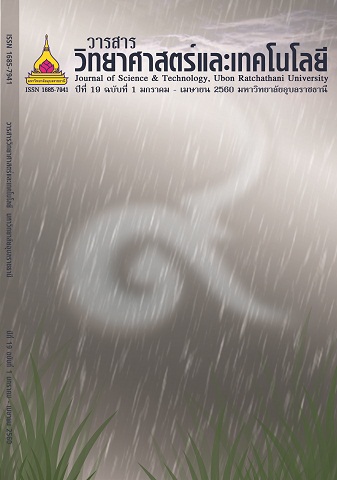พฤติกรรมการป้องกันฝุ่นหินของพนักงานโรงโม่หินในอำเภอน้ำยืน จังหวัดอุบลราชธานี
Main Article Content
บทคัดย่อ
การศึกษาครั้งนี้มีวัตถุประสงค์เพื่อศึกษาความรู้ ทัศนคติ และการปฏิบัติในการป้องกันฝุ่นหินของพนักงานโรงโม่หิน ในอำเภอน้ำยืน จังหวัดอุบลราชธานี เก็บข้อมูลโดยใช้แบบสอบถามกับพนักงานที่สัมผัสฝุ่นหิน กลุ่มตัวอย่าง 82 คน
ผลการศึกษาพบว่า พนักงานโรงโม่หินมีความรู้และทัศนคติการป้องกันฝุ่นหินอยู่ในระดับดี ร้อยละ 96.30 และ 98.80 ตามลำดับ โดยทุกคนตอบถูกต้องในเรื่อง วิธีป้องกันการหายใจเอาฝุ่นหินเข้าปอด คือ ใช้หน้ากากกรองฝุ่นขณะทำงาน และการพ่นหรือฉีดน้ำให้เป็นละอองช่วยลดการฟุ้งกระจายของฝุ่นหินได้ ส่วนข้อที่ตอบผิดมากที่สุดคือ การอาบน้ำชำระร่างกายและเปลี่ยนเสื้อผ้าหลังจากสัมผัสฝุ่นหินเป็นการป้องกันโรคทางเดินหายใจ ร้อยละ 18.30 ในด้านทัศนคติการป้องกันฝุ่นหินที่เหมาะสม ซึ่งหากทำงานในสถานที่ที่มีฝุ่นหินควรมีตรวจสมรรถภาพปอดและเอกซเรย์เป็นประจำทุกปี และมีการฉีดพ่นน้ำเพื่อจะช่วยป้องกันฝุ่นละอองตามเส้นทางขนส่งหินได้ ร้อยละ 98.80 สำหรับการปฏิบัติการป้องกันฝุ่นหินอยู่ในระดับควรปรับปรุงมาก ร้อยละ 56.10 โดยมีพฤติกรรมการป้องกันฝุ่นหินที่ไม่เหมาะสมคือ สูบบุหรี่ขณะปฏิบัติงานกับฝุ่นหินปฏิบัติเป็นบางครั้ง ร้อยละ 42.70 ใช้ลมเป่าฝุ่นหินออกจากเสื้อผ้าหลังจากปฏิบัติงาน ปฏิบัติเป็นบางครั้ง ร้อยละ 58.50 และมีพฤติกรรมการป้องกันฝุ่นหินที่เหมาะสม เช่น การเข้ารับการตรวจสุขภาพประจำปี ตรวจสมรรถภาพปอดและเอกซเรย์ปอดตามที่โรงโม่หินกำหนดให้ ร้อยละ 75.60 ทำความสะอาดบริเวณที่ปฏิบัติงาน เพื่อลดการสะสมของฝุ่นหิน ร้อยละ 50.00 และหลีกเลี่ยงการทางานบริเวณที่มีฝุ่นหินเมื่อเป็นไข้หรือร้อยละ 47.60 นอกจากนี้ยังพบว่า ความรู้ ทัศนคติกับพฤติกรรมการป้องกันฝุ่นหินของพนักงานโรงโม่หินในอาเภอน้ายืน จังหวัดอุบลราชธานี มีความสัมพันธ์กับพฤติกรรมการป้องกันฝุ่นหิน อย่างมีนัยสำคัญทางสถิติ (p > 0.05)
ดังนั้น ผู้ประกอบการควรมีการอบรมให้ความรู้แก่พนักงานในด้านสุขวิทยาที่เหมาะสมในการป้องกันฝุ่นหินเข้าสู่ร่างกาย ได้แก่ การอาบน้ำชำระร่างกายและเปลี่ยนเสื้อผ้าหลังจากสัมผัสฝุ่นหิน สูบบุหรี่ขณะปฏิบัติงาน และ การใช้ลมเป่าฝุ่นหินออกจากเสื้อผ้าหลังจากปฏิบัติงาน เป็นต้น
Sickness-prevention Behavior of Stone-crushing Mill Workers in Namyuen District, Ubon Ratchathani Province
The purpose of this study was to investigate the knowledge, attitudes, and sickness-prevention behavior of 192 stone-crushing mill workers and the relationship between these three factors. Data were collected by the completion of questionnaires and analyzed by the use of percentages. Answers to questions about the prevention of access of stone dust to the lungs by the wearing of dust filter masks and the spraying of water on the stone showed that the workers had good levels of knowledge and attitudes regarding the prevention of sickness from stone dust (96.3% and 98.8% respectively). Only 18.3% were aware of the need to shower and change clothes after working with the stone dust to protect against respiratory disease. Almost all (98.80%) of the workers recognized the requirement to have an annual pulmonary function test and x-ray and to spray water to reduce dust on the transport routes. Other results showed that 56.10% workers took preventative measures regarding stone dust, 42.70% knew it was inappropriate to smoke while working with stone dust, and 58.50% sometimes used compressed air to blow dust from their clothes after work. Over three-quarters (76.60%) of the workers believed that sickness prevention behaviors, including annual health checks, pulmonary function tests, and x-rays were appropriate, Half (50%) realized the need to clean the operating area to minimize the accumulation of dust, and 47.60% knew to avoid work areas with stone dust when suffering from a fever. The study recommended that there should be education of employees about proper hygiene to reduce the amount of dust entering the body, showering and changing clothes after work, smoking while working, and blowing dust off clothes.
Article Details
บทความที่ได้รับการตีพิมพ์เป็นลิขสิทธิ์ของ วารสารวิทยาศาสตร์และเทคโนโลยี มหาวิทยาลัยอุบลราชธานี
ข้อความที่ปรากฏในบทความแต่ละเรื่องในวารสารวิชาการเล่มนี้เป็นความคิดเห็นส่วนตัวของผู้เขียนแต่ละท่านไม่เกี่ยวข้องกับมหาวิทยาลัยอุบลราชธานี และคณาจารย์ท่านอื่นๆในมหาวิทยาลัยฯ แต่อย่างใด ความรับผิดชอบองค์ประกอบทั้งหมดของบทความแต่ละเรื่องเป็นของผู้เขียนแต่ละท่าน หากมีความผิดพลาดใดๆ ผู้เขียนแต่ละท่านจะรับผิดชอบบทความของตนเองแต่ผู้เดียว


